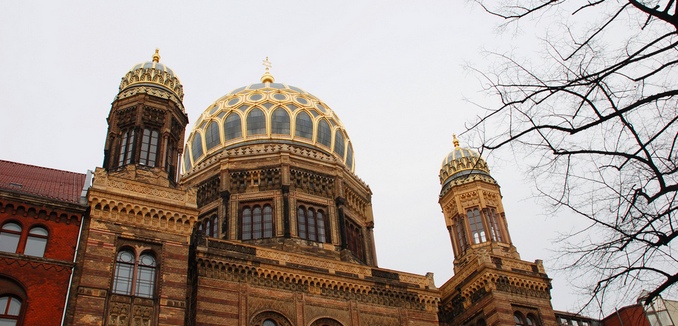The organizers of a Kristallnacht commemoration in the city of Umeå, Sweden, didn’t invite the local Jewish community because it was expected to be an “unwelcoming or unsafe situation for them” due to the efforts of anti-Israel activists, The Daily Beast reported Monday.
“Umeå Against Nazism” is set to take place in Umeå’s Town Hall Square, timed to the anniversary of the 1938 violent pogrom largely seen as the start of the Holocaust. The event’s organizer, Jan Hägglund, is a local lawmaker and member of the local socialist Workers’ Party.
The decision not to invite local Jews, he said, was because the rally could “be perceived as unwelcoming or unsafe situation for them.” According to Norrköping Tidningar, previous rallies have included Palestinian flags and banners where the Star of David was equated with the Nazi swastika. Another Workers’ Party official told The Jerusalem Post that, in the past, this rally has been “a narrow affair for ‘leftists.’”
A Facebook page for the event acknowledged that Kristallnacht was when “Nazis stepped up the violence against the Jewish population in Germany.” The page also noted that two years ago, Nazis marched in Umeå for the first time since World War II, and that the commemoration should be seen “as a defense of Umeå as a city of openness towards people with different culture, religion and sexual orientation. As well as support for those forced to flee from war and hopes for a future in Umeå.”
The anti-Israel focus of the commemoration and its exclusion of Jews prompted a number of criticisms.
“How much clearer can the anti-Semitism of the left be?” one Facebook commenter wrote. Another person added that not including Jews for a Kristallnacht memorial is like only including whites to take part in a demonstration against South African apartheid.
An unsigned Norrköping Tidningar editorial railed against the decision: “What is the point of a rally against Nazism if the relatives of the victims aren’t invited?” Another local lawmaker, Anders Ågren of the Moderate Party, said he will not participate in the event, and will instead gather with the local Jewish Association to light candles and have a moment of silence.
Sweden's Workers Party in Umea is a fulfilment of Hitler's dream; commemorating Jewish history without Jews. https://t.co/qhZnOWM7Nr
— David Semple (@DavidCarltonM21) November 10, 2015
Sweden is not the only European country where Kristallnacht specifically and the Holocaust generally have been politicized.
Benjamin Weinthal, a research fellow at the Foundation for Defense of Democracies, reported for The Jerusalem Post that many Kristallnacht commemorations in Germany have been hijacked by “segments of German society that seek to dismantle Israel.”
According to Weinthal, in the city of Munich, an anti-Israel event by activists affiliated with the Boycott, Divestment, and Sanctions (BDS) movement was held in a municipal building on Saturday. Even after the head of the Israeli consulate, Dan Shaham, in that city objected, the mayor allowed the event to proceed. Shaham observed, “The racist, anti-Semitic character of this movement, which calls for a boycott of Israel, was again made clear two days before the Kristallnacht remembrance.”
Weinthal offered two possibilities for the contradictory impulses among some Germans to both remember the Holocaust and, at the same time, delegitimize Israel.
For the city of Munich and greater Bavaria – one could argue – the attacks on Israel bleed into Holocaust commemoration as a form of inoculation against charges of anti-Semitism.
Put simply, how can Germans, who advocate BDS, be contaminated with anti-Israel anti-Semitism if they mourn the burning of Synagogues and murder-wave of Jews in 1938? The timing of Munich’s pro-BDS event coinciding with Kristallnacht may or may not be a coincidence.
The other possibility, Weinthal wrote, is ignorance about the nature of BDS.
In another incident that displayed similar disregard to the nature of the Holocaust, a far-left Dutch Jewish group invited Hanin Zoabi, an Arab-Israeli Knesset member from the Arab Joint List, to speak at a Kristallnacht commemoration on Sunday. Zoabi explicitly compared modern-day Israel to Nazi Germany and her struggle to that of Jewish victims of Kristallnacht
Standing just meters from the former site of a centuries-old Jewish orphanage decimated during the Nazi occupation of the Netherlands, she drew parallels between Hitler’s genocide against the Jews and current Israeli policy against Palestinians and Israeli-Arabs.
“I share their struggle,” said Zoabi of Jewish victims of the Kristallnacht, or “Night of Broken Glass” pogrom, now seen as a turning point leading up to the Shoah.
“The central lesson of the Crystal Night has not been learned,” said Zoabi during her 15-minute speech, delivered in English. Accusing Israel of “ethnic cleansing” modeled on Nazism, she denounced half a dozen Israeli officials by name for what she referred to as recent efforts to “justify the use of violence toward Palestinians.
The mention of Israel was to be banned at a Holocaust memorial event in Ireland in January. However, the decision was reversed after sustained protests.
Kristallnacht, which is sometimes called “Night of the Broken Glass,” was an organized riot against Jews in Germany perpetrated by the Nazis that started on November 9, 1938. Over 267 synagogues were destroyed in Germany, Austria, and Sudetenland. 30,000 Jewish men were arrested and sent to concentration camps. In the aftermath of Kristallnacht, the Nazis fined the Jews 1 billion marks for the property damage incurred.
[Photo: Trine Juel / Flickr ]




